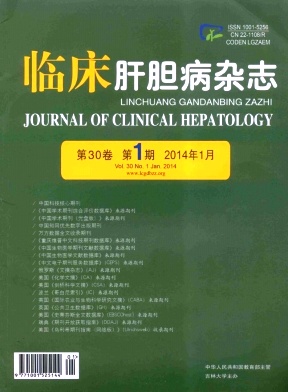|
[1]WONG F.Hepatorenal syndrome:current management[J].Curr Gastroenterol Rep, 2008, 10 (1) :22-29.
|
|
[2]ANGELI P, MERKEL C.Pathogenesis and management of hepatorenal syndrome in patients with cirrhosis[J].J Hepatol, 2008, 42 (Suppl 1) :s93-s103.
|
|
[3]ZHANG HQ, NIE X, WU B, et al.Correlation of endotoxin and hepatorenal syndrome in patients with decompensated liver cirrhosis[J].J Clin Hepatol, 2012, 15 (6) :539-541. (in Chinese) 张焕强, 聂鑫, 吴斌, 等.内毒素血症与肝肾综合征的关系研究[J].实用肝脏病杂志, 2012, 15 (6) :539-541.
|
|
[4]Chinese Society of Hepatology and Chinese Society of Infectious Diseases, Chinese Medical Association.The guideline of prevention and treatment for chronic hepatitis B[J].J Clin Hepatol, 2006, 22 (1) :3-15. (in Chinese) 中华医学会肝病学分、感染病学分会.慢性乙型肝炎防治指南[J].临床肝胆病杂志, 2006, 22 (1) :3-15.
|
|
[5] SALERNO F, GERBES A, GINS P, et al.Diagnosis, prevention and treatment of hepatorenal syndrome with cirrhosis[J].Gut, 2007, 56 (9) :1310-1318.
|
|
[6] GARCIA-PAGN JC, CACA K, BUREAU C, et al.Early use of TIPS in patients with cirrhosis and variceal bleeding[J].N Engl J Med, 2010, 362 (25) :2370-2379.
|
|
[7]CRDENAS A, GINES P.Hepatorenal syndrome[J].Clin Liver Dis, 2006, 10 (2) :371-385.
|
|
[8]WEN Y, WANG DL, LIU P.Activated protein kinase C alpha participates in the decreased glomerular filtration rate in hepatorenal syndrome induced by tumor necrosis factor alpha[J].J Med Res, 2013, 42 (3) :120-123. (in Chinese) 闻颖, 王冬蕾, 刘沛.蛋白激酶Cα激活参与肿瘤坏死因子α引起的肝肾综合征肾小球滤过率下降[J].医学研究杂志, 2013, 42 (3) :120-123.
|
|
[9]KRAG A, BENDTSEN F, HENRIKSEN JH, et al.Low cardiac output predicts development of hepatorenal syndrome and survival in patients with cirrhosis and ascites[J].Gut, 2010, 59 (1) :105-110.
|
|
[10]MOORE KP, AITHAL GP.Guidelines on the management of ascites in cirrhosis[J].Gut, 2006, 55 (Suppl 6) :vi1-2.
|
|
[11]RUNYON BA.AASLD Practice Guidelines Committee.Management of adult patients with ascites due to cirrhosis:an update[J].Hepatology, 2009, 49 (6) , 2087-2107.
|
|
[12] European Association for the Study of the Liver.EASL clinical practice guidelines on the management of ascites, spontaneous bacterial peritonitis, and hepatorenal syndrome in cirrhosis[J].J Hepatology, 2010, 53 (3) , 397-417.
|
|
[13]HARBARTH S, HOLECKOVA K, FROIDEVAUX C, et al.Diagnostic value of procalcitonin, interleukin-6 and interleukin-8 in critically ill patients admitted with suspected sepsis[J].Am J Respire Crit Care Med, 2001, 164 (3) :396-402.
|
|
[14]XU XY, ZHENG YY.Hepatorenal syndrome-vasoconstrictor or vasodilator?[J].J Clin Hepatol, 2011, 27 (8) :801-803. (in Chinese) 徐小元, 郑颖颖.肝肾综合征——缩血管还是扩血管?[J].临床肝胆病杂志, 2011, 27 (8) :801-803.
|
|
[15] GINSP, SCHRIER RW.Renal failure in cirrhosis[J].N Engl J Med, 2009, 361 (13) :1279-1290.
|
|
[16]TURBAN S, THULUVATH PJ, ATTA MG.Hepatorenal syndrome[J].World J Gastroenterol, 2007, 13 (30) :4046-4055.
|
|
[17]THABUT D, MASSARD J, GANGLOFF A, et al.Model for endstage liver disease score and systemic inflammatory response are major prognostic factors in patients with cirrhosis and acute functional renal failure[J].Hepatology, 2007, 46 (6) :1872-1882.
|
|
[18]GAO BX, NIE X, WU B, et al.Implications of elevated levels of prostagtandin I2 and thromboxane A2 in type I Hepatorenal syndrome[J].J Clin Hepatol, 2012, 28 (11) :860-862. (in Chinese) 高宝秀, 聂鑫, 吴斌, 等.Ⅰ型肝肾综合征患者前列腺素I2和血栓素A2水平分析[J].临床肝胆病杂志, 2012, 28 (11) :860-862.
|
|
[19]FENHAMMAR J, ANDERSSON A, FORESTIER J, et al.Endothelin receptor a antagonism attenuates renal medullary blood flow impairment in endotoxemic pigs[J].PLoS ONE, 2011, 6 (7) :e21534.
|
|
[20]DIVINO JN, CHAWLA KS, da SILA CM, et al.Endothelin-1production by the canine macrophage cell line DH82:Enhanced production in response to microbial challenge[J].Vet Immunol Immunopathol, 2010, 136 (1-2) :127-132.
|
|
[21]HOSHINO K, TAKEUCHI O, KAWAI T, et al.Cutting edge:Toll-like receptor 4 (TLR4) -deficient mice are hyporesponsive to lipopolysaccharide:evidence for TLR4 as the Lps gene product[J].J Immunol, 1999, 162 (7) :3749-3752.
|
|
[22]SAWAL H, UEDAL T, TAKEYAMA Y, et al.Role of toll-like receptor 4 in the pathophysiology of severe acute pancreatitis in mice[J].Surg Today, 2007, 37 (10) :867-873.
|
|
[23]RAKONCZAY Z Jr, HEGYI P, TAKCS T, et al.The role of NF-kB activation in the pathogenesis of acute pancreatitis[J].Gut, 2008, 57 (2) :259-267.
|













 DownLoad:
DownLoad: